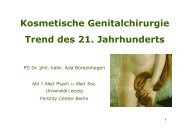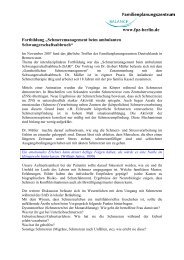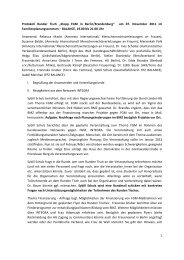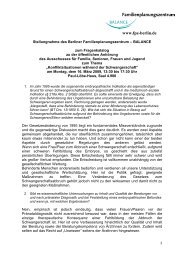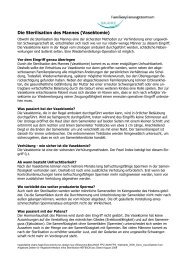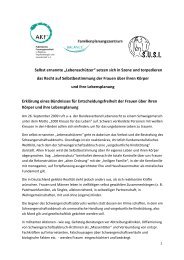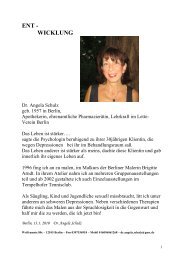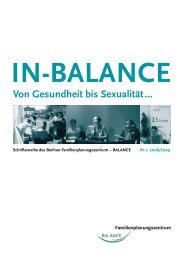Listening to African Voices - FPZ
Listening to African Voices - FPZ
Listening to African Voices - FPZ
Create successful ePaper yourself
Turn your PDF publications into a flip-book with our unique Google optimized e-Paper software.
weeks without having sex and are still not complaining.”(man of Senegalese origin)5.5.12.5. Knowledge of German law and attitudes <strong>to</strong>wardsthe abandonment of FGM/CThe interviewed participants were mostly aware of the lawprohibiting the practice of FGM/C. The greater part (16persons) wanted <strong>to</strong> see the practice s<strong>to</strong>pped. Participantsfrom practicing groups, however, emphasised that it wasvery difficult for them <strong>to</strong> oppose the tradition.“This kind of practice is just like hurting somebody. It is acrime. Have you heard positive medical information aboutit? Never. It’s a big risk, but no one can say s<strong>to</strong>p. If youtry <strong>to</strong> be against the practice then you’ll be the bad spiritagainst the tradition.” (man of Senegalese origin from apracticing group)One person advocated FGM/C and six persons were ambiguousin their attitude.“I can’t speak for others. Personally, I think that femalecircumcision just like male circumcision is a good thingthat needs <strong>to</strong> continue. Where I come from, I know thatpeople were not forced <strong>to</strong> do it. It is the women themselveswho want it. When the time of year approaches,they ask for it because they see their friends who havealready had it done.” (man of Senegalese origin)5.5.13. Guinea Bissau, Liberia and Sierra LeoneWe were not successful in interviewing significant proportionsof the immigrants from Guinea Bissau, Liberia and SierraLeone. The researchers completed interviews with ninemen and two women from Sierra Leone, with four men fromGuinea Bissau and three men and one woman from Liberia.Most of them were from practicing families and the twoSierra Leonian women interviewed had undergone FGM/C.There was no girl who had been subjected <strong>to</strong> the practice orwho was at risk in the small sample of daughters.5.6. Knowledge, attitudes and practices of communities( with < 100 immigrants)5.6.1. NigerThe registered Nigerien immigrant community is very smallin Hamburg (84 persons) and mainly composed of men (70).Moreover, FGM/C is rare in Niger and according <strong>to</strong> the lastDHS only about 2% of the women (15-49 years of age) haveundergone FGM/C. The percentage is even lower in thecohort of daughters (Institut National de la Statistique Nigerand Macro International Inc. 2007).We managed <strong>to</strong> reach a sample of 42 participants of Nigerienorigin, 36 man and 6 women. Two of them were fromfamilies were the practice has been carried out, but the largemajority had only heard about FGM/C through the media.“I have never heard of such a practice. It does not existin Niger. Or maybe in the group of the Hausa, but I havenever seen or heard of it.” (man of Nigerien origin)None of the women interviewed was from a practicing familyand none of the participants’ daughters had undergoneFGM/C. The parents also expressed no intention of subjectingtheir daughters <strong>to</strong> the practice. The majority of theparticipants knew that FGM/C was not allowed in Germanyand advocated for its abandonment.“It is not good. The woman has no desire for sex and shecannot hold her urine. The man has <strong>to</strong> work a lot duringsex.“ (man of Nigerien origin)“I don’t like this practice. It’s a tradition and not a religiouspractice. This thing is not good and it should bes<strong>to</strong>pped.” (man of Nigerien origin)“I can’t imagine that thing [FGM/C] <strong>to</strong> be done on ayoung baby or girls. It is an evil practice that women andthose who force it upon their girls should be ashamed of;they should be punished. I strongly believe that it is nota religious practice. It is not in the Quran because Godcould never ask us <strong>to</strong> do such thing.” (woman of Nigerienorigin)5.6.2. MaliAccording <strong>to</strong> official records, the Malians are few in Hamburg:49 boys/men and 21 girls/women. Despite this smallnumber, we deployed efforts <strong>to</strong> reach the community asFGM/C is widespread in Mali and more than eight out often women are estimated <strong>to</strong> have undergone FGM/C. In theregions of Kayes, Koulikoro, Sikasso, Segou and the capitalBamako, almost all women have been subjected <strong>to</strong> thepractice. The practice is less common in the three Northernregions (Kidal, Gao and Tomboc<strong>to</strong>u). All ethnic groupspractice FGM/C but the extent is considerably lower in thegroup of the Tamachek and the Sonrai (Cellule de Planificationet de Statistique du Ministère de la Santé, DirectionNationale de la Statistique et de l’Informatique du Ministèrede l’Économie, de l’Industrie et du Commerce et al. 2006).A <strong>to</strong>tal of 40 immigrants from Mali, 10 women and 30 men,agreed <strong>to</strong> participate in an interview. They were mainly Muslimsbetween 18 and 45 years of age, with an average age of35 years. All but four of the participants had roots in practicingethnic groups and 29 of the 40 participants reported<strong>Listening</strong> <strong>to</strong> <strong>African</strong> <strong>Voices</strong> 75





